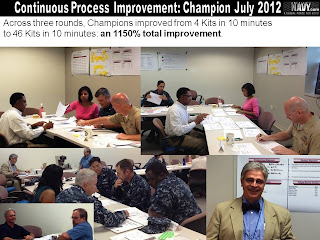Today and Tomorrow: Commemorative Edition of Ford's 1926 Classic by Henry Ford My rating: 4 of 5 stars Brilliant, though somewhat utopian in outlook. I was somewhat surprised to see that Henry Ford outlined a complete and modern continuous process improvement program back in 1926 -- long before quality circles, total quality management, and lean six sigma. The basic message of the book is that good business management can save the world. Ford cites multiple examples from Ford Motors where better management improved the bottom line and also improved the lives of his workers. The book reads somewhat like an Ayn Rand novel - the producers of the world carry the load for the moochers. Ford does offer ample advice and has a very quotable writing style. The only thing that kept me from giving it five stars was the constant droning about how Ford Motors is the best thing since sliced bread. Otherwise, this is a very good book, maybe a must read, for those interested in continuou
Posts
Showing posts from July, 2012
Simulated Process Improvement is Easy!
- Get link
- Other Apps

We just completed the first annual training cycle (Oct 2012-Sept 2012) of our resurrected Continuous Process Improvement program. Our first year goals (and invested resources) were fairly modest. We planned to train an initial cadre of practitioners (check), execute several proof-of-concept projects (check), re-institute the local CPI collaborative (check), grow an in-house instructional capability (check), and embed CPI as an integral part of the strategic planning process (semi-check). In some ways, I think we might have aimed too low. It is common to achieve 1000% improvements in simulated processes during training. In our most recent class, we improved over a baseline production of 4 products in 10 minutes to a final production of 46 products in 10 minutes -- 1150% improvement in production and a cycle time improvement from 150 seconds per product down to about 13 seconds per product. If we could accomplish that in real life -- our biggest problem would be trying to figure out ho
Acknowledging Milestones: 50 Projects and Counting
- Get link
- Other Apps
Two overlapping tidbits of information caught my eye this last week. First, I am trying to persuade my boss to send me to a Lean Six Sigma Master Black Belt course. In the description of the course, a Master Black Belt candidate is described as a Black Belt with an experience level equivalent to 50 process improvement projects. Second, I visited the blog of a very well-known practitioner who indicates that his experience level consists of "over 250 projects" completed. It got me thinking: I wonder how many projects I have completed? I found it surprisingly hard to count projects, even harder to count them honestly. The hard part isn't remembering the work. The hard part is determining what constitutes a project, and which projects count as personal experience. Do all projects have to be continuous process improvement to count? Does a rapid improvement event count as a project, or should I only count full projects? If I manage the project manager (i.e., he or she works